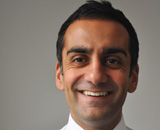 Regular readers of my blog will know that this week is TEDMED, the US based event that looks—with a multidisciplinary lens—at the future of health and medicine. I’m TEDMED’s clinical editor, one of the four person core editorial team that recommends topics and speakers to the curator, the ever curious Jay Walker. I thought I’d use my Heathrow-to-Dulles time to reflect on some of the themes of the programme that we’ve put together.
Regular readers of my blog will know that this week is TEDMED, the US based event that looks—with a multidisciplinary lens—at the future of health and medicine. I’m TEDMED’s clinical editor, one of the four person core editorial team that recommends topics and speakers to the curator, the ever curious Jay Walker. I thought I’d use my Heathrow-to-Dulles time to reflect on some of the themes of the programme that we’ve put together.
Let’s start with an obvious one: big data. I have bemoaned the overuse of this term in the past but our focus is less on the bombastic (ie poorly thought through) and more on the societal shifts that will be needed to create truly valuable knowledge. We’re generating data all the time, but where is it? How do we get to it? And if we believe that pooling our data can create valuable insights, how do we make that happen? I’m sure that one of our speakers will ask yet again whose data is it anyway, an echo of a thought I heard perhaps a decade ago, but was beautifully stated as a civil rights issue at last year’s event.
Power is a theme close to my heart (so much so that I have been convinced to do a talk). The days of monolithic decision makers presiding over the future are rightly ending thanks to how the internet has made it possible for more people to see and question information. But it’s not all about the internet. Communities are self organising, taking back the right to define their existence, a right (perhaps) unintentionally taken from them by the drive to make life cheaper. One speaker, notably from the commercial sector, will consider the impact of healthcare’s business model on the desire to do good. There will even be reflections on the assumptions we make when we shape knowledge, given that “knowledge is power.”
As befits an event that hopes to stimulate new thinking (see my previous post to understand TEDMED’s aims), we’ll be inviting the community to consider whether the two step model of wellness and illness is all there is to it. And while we’re questioning things in two we’ll consider whether it’s really only about care givers and care receivers; is there a third community we’re not seeing?
Seeing, or not, is a theme for a session in which we explore whether how we approach things limits our ability to understand them. We’ll see a new way to image the heart made possible by super computing. And, less literally, we’ll consider whether there is more to the consultation than just “seeing” a patient. We’ll even ask whether how we see Phase III trials is limiting our ability to unlock the potential of existing treatments.
So much of healthcare is about communication. I always like to remind people that communication is not what is said, but what is received. In healthcare we’ve known for some time that any meaningful impact on health will come from better societal organisation, but does that really get through to those in charge of organising society, the politicians. We’ll hear from one speaker who heard loud and clear. On a more micro level, one speaker will also ask whether we even know what the language of healthcare is—quite a fundamental question in an industry with communication at its core.
Technology seems to evolve faster and faster these days and one speaker will describe how they’re imaging the future while they’re still dreaming up the tools to create it—and how they’ve secured some pretty serious funding and endorsement to go on that journey. Another will ask the community whether it really makes sense for the medical profession to try to define the future of healthcare when it’s really not shaped to cope with onslaught of change. And staying with “coping” one speaker will ask whether the profession is coping at all, or whether it’s time to look in the mirror and have a rethink.
Most of these issues are huge. Many would be the subjects of weeklong conferences. At TEDMED, we intentionally set out to give the community a “TED ache,” to make their heads hurt with so many great topics and insights. The aim is to get a conversation going, to stimulate creativity, to seed new and unexpected collaborations.
As I said when I first joined TEDMED, “I hope that we’ll catalyse courageous reinvention, big ideas, and new thinking.” And I hope that you enjoy the fruits of our labour, whether you’re at the event, at one of the simulcast locations in 80 countries, or watching after the event online. We look forward to getting your feedback.
And so, without further ado, it’s time for TEDMED…
TEDMED is at the Kennedy Center in Washington, DC, USA, from Tuesday April 16th until Friday April 19th.
Competing interests: I am a paid consultant to TEDMED.
Pritpal S Tamber is the director of Optimising Clinical Knowledge, a consultancy that helps organisations in and around healthcare design clinically credible strategies that have a measurable impact on care. Follow him on Twitter, @pstamber.
